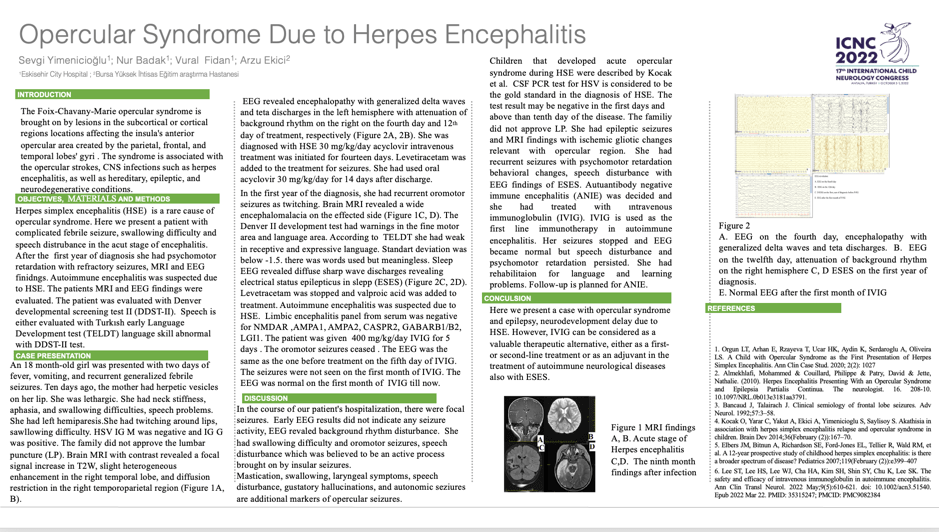Opercular syndrome due to Herpes Encephalitis
Sevgi Yimenicioglu, Nur Badak, Vural Fidan, Arzu Ekici
Objectives: Herpes simplex encephalitis (HSE) is a rare cause of opercular syndrome. Methods: Case report Results: An 18 month-old girl was presented with two days of fever, vomiting, and seizures. Ten days ago, the mother had herpetic vesicles on her lip. She was lethargic. She had neck stiffness, aphasia, and swallowing difficulties. She had left hemiparesis. HSV IG M was negative and IG G was positive. The family did not approve the lumbar puncture. Brain MRI with contrast revealed a focal signal increase in T2W, slight heterogeneous enhancement in the right temporal lobe, and diffusion restriction in the right temporoparietal region. EEG revealed encephalopathy with generalized delta waves and teta discharges in the left hemisphere with attenuation of background rhythm on the right on the fourth day and 12th day of treatment, respectively . Opercular syndrome was decided. She was diagnosed with HSE and 30 mg/kg/day acyclovir intravenous treatment was initiated for fourteen days. Levetiracetam was added to the treatment for seizures. She had use oral acyclovir 30 mg/kg/day for 14 days after discharge. In the first year of the diagnosis, she oromotor seizures. Brain MRI revealed a wide encephalomalacia on the effected side . The Denver II development test had warnings in the fine motor area and language area. Sleep EEG revealed diffuse sharp wave discharges . Autoimmune encephalitis was suspected due to HSE. Conclusion: Here we present a case with opercular syndrome and epilepsy, neurodevelopment delay due to HSE.
Keywords: Herpes Encephalitis, Opercular syndrome, Epilepsy
Sevgi Yimenicioglu
Turkey
Nur Badak
Turkey
Vural Fidan
Turkey
Arzu Ekici
Turkey
Objectives: Herpes simplex encephalitis (HSE) is a rare cause of opercular syndrome. Methods: Case report Results: An 18 month-old girl was presented with two days of fever, vomiting, and seizures. Ten days ago, the mother had herpetic vesicles on her lip. She was lethargic. She had neck stiffness, aphasia, and swallowing difficulties. She had left hemiparesis. HSV IG M was negative and IG G was positive. The family did not approve the lumbar puncture. Brain MRI with contrast revealed a focal signal increase in T2W, slight heterogeneous enhancement in the right temporal lobe, and diffusion restriction in the right temporoparietal region. EEG revealed encephalopathy with generalized delta waves and teta discharges in the left hemisphere with attenuation of background rhythm on the right on the fourth day and 12th day of treatment, respectively . Opercular syndrome was decided. She was diagnosed with HSE and 30 mg/kg/day acyclovir intravenous treatment was initiated for fourteen days. Levetiracetam was added to the treatment for seizures. She had use oral acyclovir 30 mg/kg/day for 14 days after discharge. In the first year of the diagnosis, she oromotor seizures. Brain MRI revealed a wide encephalomalacia on the effected side . The Denver II development test had warnings in the fine motor area and language area. Sleep EEG revealed diffuse sharp wave discharges . Autoimmune encephalitis was suspected due to HSE. Conclusion: Here we present a case with opercular syndrome and epilepsy, neurodevelopment delay due to HSE.
Keywords: Herpes Encephalitis, Opercular syndrome, Epilepsy
Sevgi Yimenicioglu
Turkey
Nur Badak
Turkey
Vural Fidan
Turkey
Arzu Ekici
Turkey

Sevgi Yimenicioglu
Turkey
Turkey